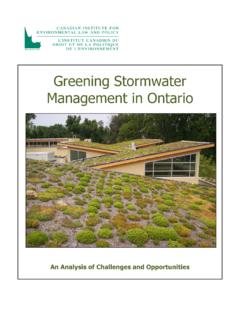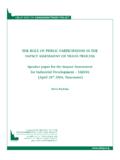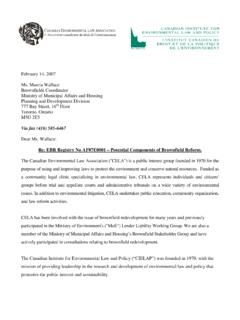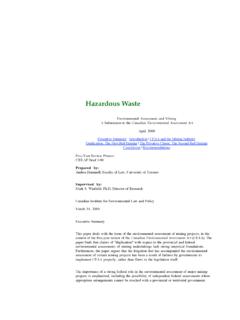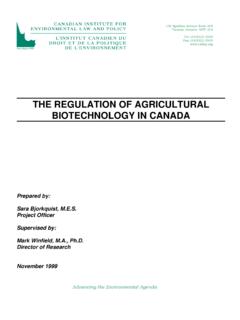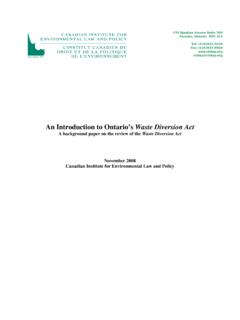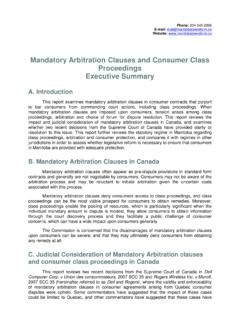Transcription of WALKERTON INQUIRY FINAL REPORT: A …
1 CANADIAN INSTITUTE FOR ENVIRONMENTAL LAW & POLICY. WALKERTON INQUIRY FINAL report : a summary AND A RESPONSE. By Christine Elwell, , , June 13, 2002. Introduction The Canadian Institute for Environmental Law and Policy presents this summary of the WALKERTON INQUIRY report 2, released Thursday May 23rd, 2002, containing over 90. recommendations. The purpose of this summary is to compile the main subjects covered to better understand the recommendations, to facilitate a comparison of the provincial government's response to the report and to protect Ontario's drinking water sources.
2 Any commentary on the report is in italics, otherwise the highlights provided are actual quotes from the report , complete with page references to the full report . Please also note that some footnotes in the text have been deleted. The full report can be found at The topics covered in this summary are as follows: 1. Main Recommendations .. 2. Main Elements of the Safe Drinking Water Act .. 6. On Public 7. On the 8. Setting Standards in Canada .. 8. On Full Costs .. 9. Sustainable Asset Management .. 10. On Metering .. 10. Environmental 11. The Proposed Sustainable Water and Sewage Systems Act.
3 11. Household Affordability .. 12. On the Role of the Ministry of the Environment .. 12. On Watershed Source Protection Plans .. 14. Watershed Source Protection Plans .. 14. On Water Quantity and 15. On Conservation Authorities .. 16. On the Role of 17. On the Private Sector .. 20. On Standards and 22. On the Precautionary Principle and risk 23. On Alternative Technologies .. 24. 1. On Alternative Treatment .. 25. On Sampling and Monitoring .. 26. Role of Laboratories .. 28. On the Role of 28. Main Recommendations I recommend that the Province develop a comprehensive, source-to-tap, government- wide drinking water policy and enact a Safe Drinking Water Act embodying the important elements of that policy.
4 The purpose of the Safe Drinking Water Act (SDWA). is to gather in one place all legislation and regulation relating to the treatment and distribution of drinking I recommend that the government establish two specialized branches within the Ministry of the Environment (MOE). These branches would be responsible, respectively, for watershed planning and for overseeing water systems. It is essential for the Province to strictly enforce drinking water regulations and to commit sufficient resources, financial and otherwise, to enable the MOE to play this role effectively.
5 I propose that the MOE take the lead in developing and implementing the , . (having) the knowledge and experience required to oversee water treatment, monitoring, distribution, and the competent management of a water system. To date, the MOE has conducted investigations and prosecutions of those suspected of non-compliance with regulatory requirements through its Investigations and Enforcement Branch (IEB). I am satisfied that the IEB of the MOE should remain as presently constituted, a separate branch within the ministry. The reason commonly given for outsourcing government functions is cost savings, and there is no doubt that outsourcing the inspections function may provide cost savings to the government.
6 Cost is always important, but some government functions are of such a nature that the potential for cost savings alone should not lead to a decision to transfer all or part of the government regulatory function to a third party. In my view, the oversight of the safety of Ontario's drinking water is such a function As I discuss in Chapter 13, the provincial government should not devolve or transfer its regulatory function to third parties unless it is established that this will result in greater safety. Specifically, I propose that cost should not be the reason for any devolution.
7 P. 324 . 1. Legislation related to drinking water, as well as virtually all of the recommendations in my report , should be put into four pieces of legislation, together with relevant regulations hereunder: a new Safe Drinking Water Act, containing provisions dealing with the treatment and distribution of drinking water; amendments to the EPA and regulations hereunder, containing provisions necessary to bring my source protection recommendations into effect; an act or regulation dealing with drinking water protection on farms; and an Act governing asset management in relation to municipal water systems.
8 P 405. 2. The total costs of my recommendations, including the one-time costs amortized over 10. years at 7% interest, would amount to an average of between $7 and $19 per household per Comparing the average water rates with those for less essential services such as cable television, telephones, or Internet access makes this point powerfully. The cost of the WALKERTON tragedy itself also makes for a compelling comparison. A. study commissioned by the INQUIRY estimates the economic impact of the WALKERTON events to be more than $ Of course, this figure does not include the tragedy's great impact in terms of human suffering and loss of life.
9 Still, it does show that from an economic standpoint alone, the costs of a system failure can be enormous. The provision of drinking water is characterized by a high degree of natural monopoly. The service in terms of both water treatment and distribution can realistically only be provided by a single entity. The need to ensure the accountability of that entity is acute and, as such, it is understandable why municipalities have played a central role in the provision of drinking water. Over 80% of Ontarians are served by municipally owned water systems.
10 Although municipalities are permitted to sell their systems, there was no suggestion during the INQUIRY that any municipalities are even considering doing so. Moreover, nothing I heard during the INQUIRY led me to conclude that I should make recommendations about the ownership of municipal systems in order to address water safety issues. Given that municipal responsibility and accountability flow from municipal ownership, I. see no advantage for safety reasons to turning over ownership of municipal water systems to either the provincial government or to the private sector.
